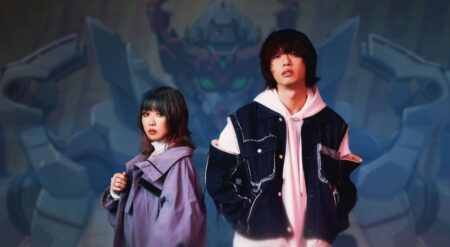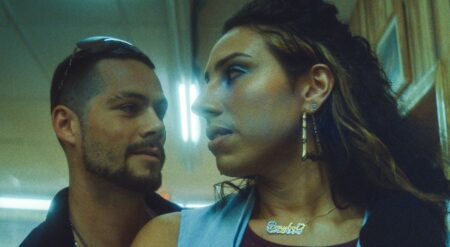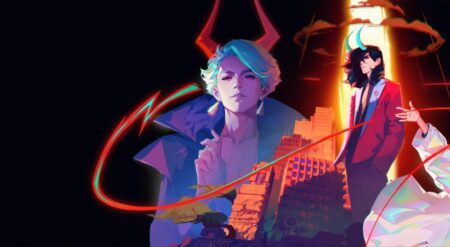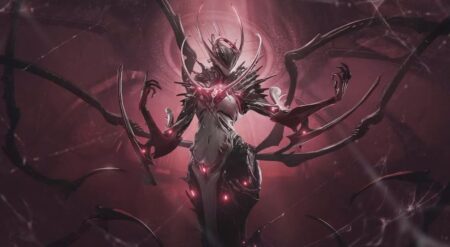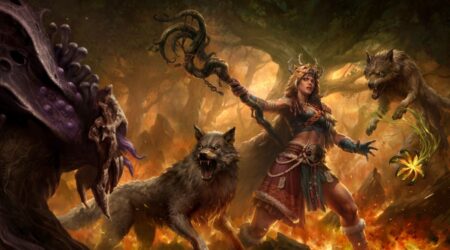Look, I didn’t think I would like Koana at first. His minty green hair and minty green coat are a lot. But as his story developed throughout Final Fantasy XIV: Dawntrail‘s Main Scenario Quest (MSQ), he hit me like a ton of bricks. For those who haven’t checked it out yet, Dawntrail is the latest expansion for Square Enix’s critically acclaimed and beloved MMORPG Final Fantasy XIV. Endwalker, its previous expansion, marked the end of a 10-year saga. Dawntrail takes the game to a new continent, Tural. A love letter to Latin American culture and mythologies, this expansion also boasts a cast of predominantly Latino voice actors.
Beyond its tacos and color palettes of golds, greens, and reds, Dawntrail is a thoughtful expansion that doesn’t just showcase cultures in all of their beauty. It also empowers its characters to tell universal stories, which can be seen deeply within the context of their voice actors’ Latinidad. We spoke with Koana’s voice actor, Luiz Bermudez, about the role, Dawntrail’s impact, and what the voice acting landscape is like for Latinos.
For me, Koana hit home as a character as grew to understand that he doesn’t have all the answers—no matter how much Eorzean knowledge he has. When I went to college, I came back and immediately thought that I knew everything. That I was better than my home, better than my culture, and I didn’t need anyone. But the reality is that while I had left home and found a different kind of knowledge, my family and their stories weren’t anything less. Instead, now that my grandparents have passed on, I yearn for their knowledge and look out to learn from the elders in my Mexican American community when I have the chance.
While this was a Latino experience for me, it’s also a universal one. It’s an immigrant experience, the experience based on class, an experience about leaving home and thinking that where you end up is so much better that you begin to forget your people. As I opened up to Luis Bermudez, he explained exactly why Koana resonated with many FF14 players.
“I feel like a lot of us can, can empathize with somebody who leaves their country to acquire resources or tools from somewhere else that he’s just not able to get where he’s based at. He sees [Eorzea] and [it] is kind of moving into the future in a lot of areas that he wants to kind of bring to his home country. When he comes back, he’s kind of lost in the sauce of that a little bit. By the time he returns, he’s kind of forgotten why he went out there, and instead, he’s just angry at how far behind he perceives how his own culture [to be],” Bermudez explained.
He continued, “[Koana] gets this great journey that he gets to go through where he learns that maybe his culture is different from the world beyond. But there are things he can introduce to improve the quality of life that his people have [in Tural] without necessarily stripping away the importance of their culture, their beliefs, and their ideals. And it’s a really beautiful story.”

But it’s not just his story of return that resonates; it’s also the love he has for his sister, Wuk Lamat, Dawntrail’s protagonist. He added, “I’m a brother, and I have absolutely thrown down to protect my sisters, and it’s something that was incredibly close to me. When I was offered to play him, my biggest concern was if they would let me just do this as honestly and as truthfully as possible.”
That authenticity shines through Luis Bermudez’s performance as Koana. He’s vulnerable, he’s fierce, and he loves his sister and his people. We asked Bermudez how he worked to capture Koana’s complexity with his acting. To which he responded, “It’s a lot of waiting for this moment as an actor. I think that came through because I’ve been very lucky to have a full time career for the last three years that I’ve been doing this professionally. But you don’t get a dialogue like [Koana’s dialogue] often, and as far as localization goes, this is one of the most beautiful scripts I’ve ever been handed. When I saw the words that I had the pleasure of reading, I was just like, ‘Oh, someone cooked here.'”
FF14‘s localization has long been praised by the game’s community for its attention to detail, wordsmithing of puns, and much more. And in Dawntrail, it continues with emotion, “When it’s [done that well], it’s easy to just kind of connect. I’ve worked really hard to get to a place in my level of performance, I guess that it’s it’s less about performing the emotion and more about just drawing from wherever that that real place and that real connection comes from. For me, it was drawing from a place of wanting so badly to just do well—to be in a place where I can provide for the people that I love and care about and take as much off of their plate and their shoulders as humanly possible.”
And that’s Koana’s core as a character. He wants to provide for his people and, more importantly, protect his family, which Bermudez found in his own experience. “Growing up, my dad was not the best guy. He bailed, and he kind of left me and my sisters and my mom with not a lot of resources and a whole lot of trauma. And so the thing I heard a lot when I was a kid was ‘you’re the man of the house’—which is heavy for a seven-year-old. I took [that phrase] very literally. When things happened that I perceived as slights towards my home, I took them very personally. I was also a very angry young kid because of a lot of things that were going on in my life. That bubbling, kind of simmering anger, [is something] I think Kona has in a few scenes. He’s a very controlled character, but there are a couple of times where he does kind of let go of those reins and let that stuff that’s bubbling under the surface kind of come out. And that was very easy for me to just kind of tap into because that’s my existence.”
Dawntrail’s embrace of Latin American culture beyond just window-dressing is one of the most celebrated elements of the expansion. But the representation that the game gives by casting Latino voice actors makes the game’s impact resonate even more. I asked Bermudez about the rarity of seeing so many Latinos on a cast list and the impact that Danwtrail has on players and the cast involved.
Read our interview with Naoki Yoshida about Latin American representation in FF14 Dawntrail.
He answered, “Recording for the characters that I was recording for initially, they were so well written. There was truly no, like, like, cannon fodder, there was no chaff. It was all just quality stuff, and [Square Enix] really did their homework. I think, that’s a testament to Kate Cwynar and like their entire localization team—they really wanted to do their homework, and really wanted to do this right, not just adopt a Mesoamerican skin. They really cared, and that comes down from Yoshi P.—he even wanted to make sure that it was as authentic of a representation as possible. Then the localization team just took it and ran—which was awesome to see. When I saw the cast list, I was excited, because a lot of my friends were in that. A lot of people that I came up in the industry, Melissa Medina, Jessie Alexander, I mean, Sena [Bryer]—there are so many people that I came up with.”
Bermudez continues, “I have had these conversations where I’m just like, yeah, ‘I’m playing another guy named Miguel and says weird Spanish [words] in places that don’t make sense, and I’ve got to basically rewrite the whole script.’ As lovely as it is to represent my culture through my art, there are also plenty of times when the character is written very two-dimensionally—or frankly, one-dimensionally. But with Koana, he was a human being. He was fully realized. He had flaws and goals and gross things about him and beautiful things about him. There was so much dimensionality. It was amazing, amazing to see.”
As a player, it’s that depth that made me fall in with Koana as well. When I first saw the character, his minty hair and coat put me off. But after the very first section, we get to explore his character and his relationship as a big brother to Wuk Lamat, where he came to life. His flaws came to light, his love did too. But Koana isn’t the only one.
“All the characters are written that way down from like Gurfurlur, which could easily just be somebody who they took a sound mixer and did God knows what to, but instead he’s this ancient being who has real hopes and dreams for his people. He wants them to be respected, and when they show up to cause all this riffraff, he’s like, ‘Oh, not in my house. Knock it off.’ It’s lovely, man. It’s awesome to see. Because even when stuff is made almost demonstrably for us, it’s still like touch and go, and it’s almost weird to see people [who aren’t Latino] do it so well. But they did.”

When we spoke with Naoki Yoshida at the Danwtrail media event, he explained the team’s dedication to getting Latin American representation right and honoring the region’s culture. “If we look back on past games, like in general, in Japan, there wasn’t as much open communication with cultures outside of [the country]. They kind of just took a literal interpretation on their own and depicted [other cultures] in that way. But coming into the modern age, we have so much information and more opportunities to talk directly with people of those Indigenous cultures,” Yoshida explained regarding Valigarmanda and other video game bosses that drew inspiration from other cultures.
He continued, “[Our team] wanted to make sure that we’re paying respect to our source material; we wanted to be very careful about it. So, in the case of Quetzalcoatl, to those indigenous people, that’s sort of their deity. We wanted to make sure that we understood the culture behind it and what kind of mythology they believed in and studied it as a development team, making sure that we knew what we were talking about when we were depicting [Quetzalcoatl]. And then with that understanding, [we ask] ‘Okay, so how does this translate into Final Fantasy XIV.‘ And that’s the kind of discussion that we start off with.”
To close out the interview, I asked Luis Bermudez if he had thought about Koana. His contribution to the long legacy of Final Fantasy XIV may be a pivotal moment of falling in with the game or the larger franchise.
“Oh, God, no! That’s wild to think of because mine was Tidus. I mean, if there’s one thing I think people could take away from it… the overarching theme and mission statement of Dawntrail is that other cultures, and how they’re different from our own, are beautiful. They’re poetic, and they’re tragic, and they’re comedic, and everything that you view in your own home is happening in someone else’s home, millions and millions of miles away, and there’s something incredibly beautiful about that.”
And the importance of accepting others extends to other characters that aren’t his own as well. Bermudez expanded by talking about Wuk Lamat, “I saw a lot of stuff where people were just like, I wish we were following Koana instead of Wuk Lamat. And I think that’s the wrong message to take away because Wuk Lamat is this amazing character who is and is entirely a female himbo. She’s dumb as rocks but so handsome and so sweet and just so earnest and well-intended. I think you should go through life with the kind of eyes that Wuk Lamat has and be willing to fall in love with her culture as she kind of remembers the things that she left behind when she when she left and now is coming back. I feel like, for her, she comes back, and the first thing she does is celebrate all these amazing things that she missed when she left. And Koana sees problems to fix. Both of those things are valuable. But I think the ending message of Dawntrail is where you find its heart, and that’s tied up around the people that are in it, and how they relate to each other. It’s where culture meets advancement and all of that. It’s a beautiful, beautiful thing to kind of explore.”
Final Fantasy XIV: Danwtrail is out now on PC, PlayStation 5, and Xbox Series X.


